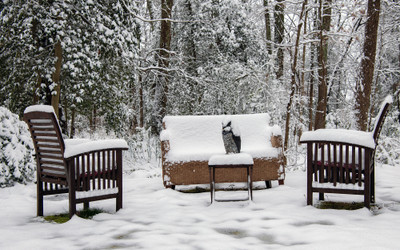The Best Way to Clean and Store Your Patio Furniture This Winter
9th Oct 2023
As autumn settles in, your patio furniture will see less and less use. Eventually, you’ll prefer snuggling under a blanket on the family room couch to hanging out on the porch. When that happens, what do you do with your patio chairs and other outdoor furniture?
There are a number of ways to get your outdoor patio furniture ready for winter. A lot depends on your storage situation and the type of furniture.
Here are a few tips on outdoor furniture storage and care.
How to Clean Outdoor Furniture
You’ve spent good money on your patio chairs, outdoor dining sets, rockers, Adirondack chairs, bar stools, loungers and loveseats. To keep your patio furniture in the best possible condition, it’s a good idea to clean it before you put it away. This will help prevent mold and mildew from forming and minimize stains from dirt and dead leaves.
How you clean your patio outdoor furniture depends on what it’s made of. Before you start, check with the furniture’s manufacturer for specific care instructions. If that isn’t possible, these cleaning tips should do the trick.
Molded resin: Wipe it down with a rag or sponge soaked in soapy water (dish soap is fine). Use an all-purpose spray cleaner for persistent stains. Let your furniture dry completely before storing.
Wood and wicker: Wipe down your wooden outdoor furniture and wicker furniture with mild soap and water or wood cleaner. Power washing is not recommended. Wipe down with a clean towel and let dry. If your wood or teak furniture has seen better days, you may be able to revitalize it with teak oil. As a last resort, consider sanding it lightly, staining or painting it.
If your wood or teak outdoor furniture has seen better days, you may be able to revitalize it with teak oil. Alternately, consider sanding it lightly, staining or painting it.
Metal and aluminum: Clean aluminum patio furniture with mild soap and water or wood cleaner. Allow your metal furniture to dry thoroughly. If possible, cast iron furniture is best stored away from the cold and damp, to help prevent rusting.
Plastic: You can give your molded plastic furniture a good hose-down or clean it with all-purpose spray cleaner. Attack persistent stains with a paste made of baking soda and a little water, or with a little liquid dishwasher detergent mixed into a bucket of warm water. Rinse until water runs clear and let dry.
Cushions: The covers on your outdoor furniture cushions may be removable and machine washable. If not, you’ll want to clean them by hand.
First, thoroughly vacuum the cushions, using the wand attachment to get into creases, seams and piped edges. Scrub any areas that are stained or mildewed with a brush and a mild solution of vinegar and water, or a mixture of water, dish soap and Borax. Rinse the cushions, then gently squeeze out the excess water. Prop up the cushions vertically and let them dry completely. Store your outdoor cushions in plastic garbage bags or cushion covers to protect them from dirt, insects and other small creatures.
Hammocks and Umbrellas: You can clean a hammock while it is hanging or spread it out on the grass. To clean a table umbrella, remove it from its stand. (Pick a day that isn’t windy.) Open it and gently lay it on its side for easier access. Brush away surface dirt.
Hammocks and outdoor umbrellas are made from durable weather resistant materials that can withstand a good spray with a hose (not a pressure washer) or a wipe-down with mild detergent. Rinse thoroughly and dry completely before storing.

How to Cover or Store Outdoor Furniture
In mild climates, it may not be necessary to put away your patio furniture set. It’s a different story, however, if your part of the country gets lots of winter snow, ice and freezing temperatures. In that case, try to bring anything you can indoors.
If you’re currently looking for fall deals on patio furniture you can use next year, consider your storage situation before making your purchase. Folding chairs and stackable chairs, for instance, don’t take up much room in a garage or shed.
No room for a backyard shed? Consider renting a storage unit. Or check for furniture sheds or cushion storage bins at your local home improvement store. You can find a resin style vertical outdoor storage cabinet or bench in a range of sizes. Some are compact enough to fit on a back porch or balcony.
If bringing your furniture indoors or stashing it in a shed isn’t an option, try to shelter your outdoor furniture as much as possible. Place furniture under a roofline, such as a covered porch or patio. Pull furniture away from exposed openings and toward a wall or protected corner.
Many people cover their furniture with waterproof tarps, tightly wrapped around the base with bungee cords or rope to prevent the wind from dislodging the covers.
Tarps will help protect your furniture, but may trap moisture that can lead to mold and mildew. Instead, consider buying fitted furniture covers that are made of breathable materials to prevent growth of mold and mildew.
Protect Your Outdoor Furniture Investment
Finding patio furniture that fits your taste and budget can be a challenge. Properly cleaning and storing your outdoor furniture will protect your investment and ensure that you can enjoy comfortable outdoor seating for you and your guests next summer and for years to come.
You may also like:
Stay a While Longer: Decor Swaps Extend the Season of Your Porch or Patio
Teak Wood Furniture: Durability and Elegance for Your Patio
